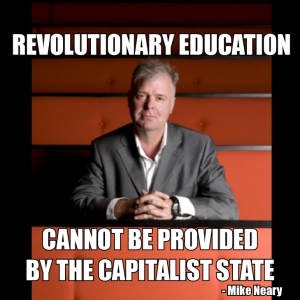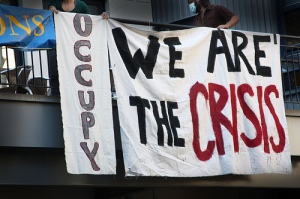Tagged: neoliberalism
Death of a Zapatista – Neoliberalism’s Assault on Indigenous Autonomy
The Zapatista struggle continues … Subcomandante Marcos ceases to exist …Galeano lives.
– by Levi Gahman –
… from the mountains of the Mexican Southeast …
On Friday May 2, 2014 an Indigenous Zapatista teacher, Jose Luis Solís López – known by his name ‘in the struggle’ as ‘Compañero Galeano’ – was ambushed and murdered. He was beaten with rocks and clubs, hacked with a machete, shot in the leg and chest, and as he lay on the ground gasping for air – he was executed by a final bullet to the head. The reason he was subjected to this callous violence varies depending upon what account is heard or read. But in truth, he was assassinated because he was Indigenous, because he was a teacher, because he was humble, and more specifically – because he was a Zapatista. And in a contemporary global system of neoliberal production and colonial governance, people like Galeano are deemed to be threats – threats that need to be killed in cold blood and suffer brutal deaths.
The assault on Galeano was also an attempt to antagonize the EZLN (Zapatista Army of National Liberation) into reacting with violence themselves as retribution for the death of one of their promotores de educación (‘promoters of education’ – what teachers are called in the Zapatista system of horizontal education). The provocation was directly aimed at the EZLN in hopes of prompting them into engaging in armed conflict, which would thereby give the Mexican state reason to retaliate and attack Zapatista communities. However, despite the pain and rage that the Zapatistas are feeling, they continue to release statements calling for peace. And amidst the tears, sorrow, indignation, and sadness they now have due to one of their cherished teachers being slain in broad daylight, they have stated they are not seeking revenge, nor blood, nor vengeance, but rather, they seek justice.
Occupying the City with the Social Science Centre – an Interview with Mike Neary
Summary: Professor Mike Neary speaks on the origins, purposes, and tensions of The Social Science Centre, Lincoln in the UK, an alternative form of higher education provision run as a formally constituted co-operative. The Social Science Centre sets itself against the usual colonial relations between universities and communities, seeking to occupy and re-invent the ‘idea of the university’ by producing critical, practical knowledge grounded in the real lives of its members. Neary raises questions about how such projects can create new, sustainable forms of social wealth against and beyond capitalism.
Reanimating Histories of Struggle as Weapons against Neoliberal Individualization – An Interview with Don Kingsbury
Summary:
Reflecting on the building occupations at UC Santa Cruz in 2009-2010 and cross-pollination between student and worker struggles, Don Kingsbury highlights the need to excavate and reanimate histories of radical movements. Under the conditions of academic precarity, and against the neoliberal privatization of the general intellect, Don calls for turning communities of necessity into communities of resistance.
Standing at the interface of academic corporatization and exploitation: why not struggle against the ‘grain’?
by Sutapa Chattopadhyay[1]
[i]t’s increasingly difficult to define what, substantively, it means to be a thinker of the Left
(Castree and Wright 2005: 6)
Not too long back I read two articles on anti-austerity protest and Quebec student strikes that were published by ClassWarU, and a few others, mostly by activist student scholars. Almost all the articles and interviews that have been published so far in this website pertinently point out the urgent need to employ alternative pathways to connect people, participation and place. There is little to no doubt that the question of happiness and wellbeing is overwhelmingly difficult to answer, as it is ensnared by the laws of neoliberal capitalist accumulation, under continuous and progressive expropriation to the creation of hierarchies and hegemonies (through continuous division of labor along sex, race, class, religion, education, and nationality) to constant production of all forms of social exclusion. The poor and middle classes have shouldered the heaviest burdens of the global political obsession with austerity policies over the past five to six years. In the United States, budget cuts have forced states to reduce education, public transportation, affordable housing, health and other social services. In Europe, welfare cuts have driven some severely disabled individuals to fear for their lives. Austerity is still the order of the day and the struggle against austerity is an all-class war orchestrated in plazas, universities, parks, streets, squares, or any public places that we can think of. This article holds my deep reactions on academic exploitation at the crossing point of other kinds of exploitation that have burgeoned as a response to neoliberal capitalism. Continue reading
If Not Eco-Socialism Now, Then When? Infiltrating universities with eco-feminist & anarchist practices
by Sutapa Chattopadhyay (Maastricht University)
Today, frankly our universities are transformed into knowledge-for-profit-enclosures, as primarily ‘branded’ universities are sold-out to the policy elites (techno-scientific foundations, business consortia and multinationals) for the progress of scientific research, on which intellectual property rights are placed that exclude most people from its benefits. This is the reason we must connect with ecosocialist, ecofeminist and anarchist strategies, as these alternative theories and praxis can undo the rigid, hierarchical, authoritarian, hegemonic and provincial university education system toward a non-hierarchical, egalitarian, emancipatory knowledge locus.
Teaching and Organizing in the Ruins of Universities: An Interview with Alison Hearn
 Summary: From the wilderness of adjuncting to university occupations and the Quebec student uprisings, professor Alison Hearn (U. of Western Ontario) discusses how we can create organizing grounds in the ruins of universities. The classroom presents possibilities for connecting pedagogy with organizing, while grappling with the tensions of context, faculty authority, and student resistance. Rather than falling into either authoritarian or hippy-dippy, de-professionalized modes of teaching, Hearn talks about how an ethically responsible approach can escape the academic capitalist rat race and build relationships across divisions of workers and students.
Summary: From the wilderness of adjuncting to university occupations and the Quebec student uprisings, professor Alison Hearn (U. of Western Ontario) discusses how we can create organizing grounds in the ruins of universities. The classroom presents possibilities for connecting pedagogy with organizing, while grappling with the tensions of context, faculty authority, and student resistance. Rather than falling into either authoritarian or hippy-dippy, de-professionalized modes of teaching, Hearn talks about how an ethically responsible approach can escape the academic capitalist rat race and build relationships across divisions of workers and students.




